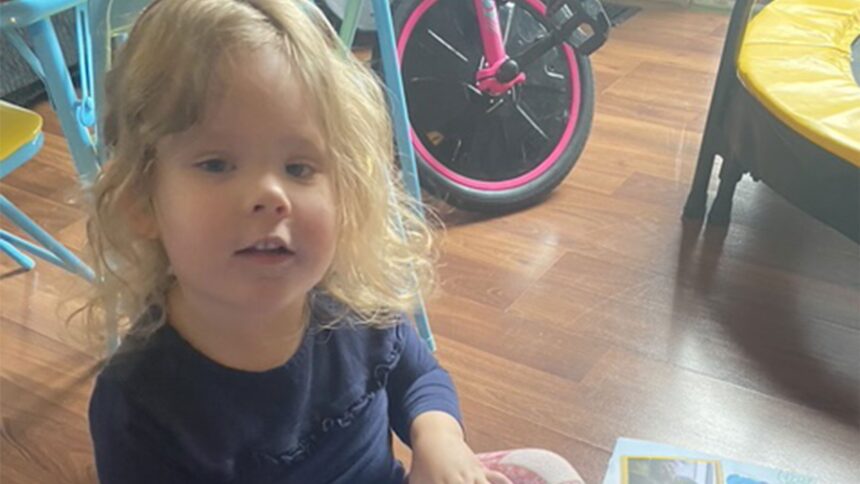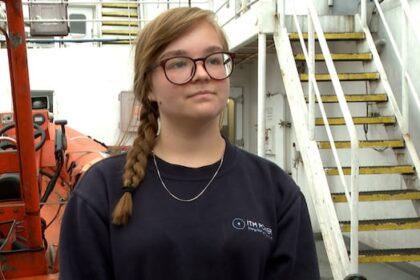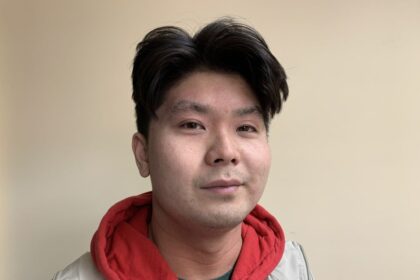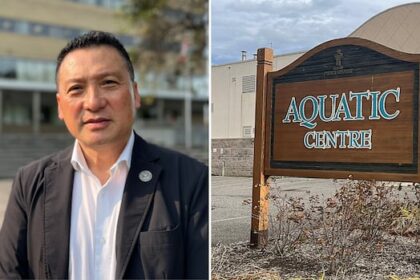Five-year-old Scarlet has the same breakfast every morning – Cheerios, yogurt, and blueberries. Predictability and routine matter to her — even a small disruption can throw her off. Scarlet’s tall for her age, but she’s still in diapers. After breakfast, her parents work on potty training. The thing is — she’s scared she’ll fall in the toilet. Her parents say her needs, likes and fears were hard for them to decode at first. Scarlet was born May 29, 2020. Even in her first year, her parents noticed something was different. She had mobility issues. She wasn’t picking up language — she was non-verbal. “We wondered if she would ever speak and if we would ever hear the words I love you from her,” says her dad, Patrick Cully. Just before she turned three, they finally got answers. Scarlet was autistic. Cully and his wife, Jamie Lynn McInnis — who is from Batchewana First Nation — live in Thunder Bay. They looked for therapy that could help. They found Applied Behavior Analysis (ABA) therapy that uses positive reinforcement to help children with autism learn life skills and correct challenging behaviours. But it’s expensive. Therapy can cost around $200,000 a year. That kind of expense would normally be out of reach. Cully is a stay-at-home dad because of Scarlet’s needs. They get by on McInnis’s income. The couple learned they could apply for support under a federal program called Jordan’s Principle. It is a legally mandated program named after Jordan Anderson, a young boy from Norway House Cree Nation who died in a Winnipeg hospital. He was never able to live at home with his family because provincial and federal governments argued over who would pay for his at-home care. The program was created to ensure First Nations children receive services without delays caused by jurisdictional disputes and to ensure culturally appropriate, equitable care. Scarlet’s parents gathered medical support letters and she was approved for therapy by Indigenous Services Canada (ISC). First at Red Arrow Wellness, later, after a year on a waitlist, at Ignite Therapy. It made a huge difference – while it lasted. On the morning APTN News spoke with her parents, Scarlet started her day finger painting with her dad. She gurgles – a happy sound – but one more typical of a much younger child. It’s hard for her to string words together, but as her mom demonstrates, Scarlet can mimic them. “Say ‘Hi Karyn,’” McInnis says. “Hi Karyn,” repeats Scarlet. Scarlet loves to sing and can mimic song lyrics. Her parents bought her a karaoke machine. Her favourite song is Let It Go, from the Disney movie Frozen. “Her singing is something we encourage in the house, even if, you know, she’s only able to mimic the sounds rather than get the words out, she’s working on that vocabulary and working on her ability to speak,” says Cully. “We’ve used songs to teach things and so there’s, Clean up. Clean up,” McInnis starts singing, and as she does — the song catches Scarlet’s ear – and she joins in. For a second, it’s a duet, “Everybody, let’s clean up.” McInnis laughs. “That’s how we taught her to clean up her toys,” she says. School was the next step Scarlet and her father in an undated photo courtesy of the family. Scarlet enrolled in an Entry to School program. It was co-hosted by Ignite and George Jeffrey Children’s Centre, which are health and behavior therapy programs. These were to help get Scarlet ready for the transition to a real school. In September 2024, she went for her first day at Lac Des Mille Lacs IR Churchill — a school that offers land-based learning and teaches the Ojibwe language, McInnis’ mother tongue. Scarlet was nervous, according to Cully. At school they got her coat off, changed her into her indoor shoes and found her cubby. Cully left – but 45 minutes later – Scarlet’s first day at school came to an agonizing end. “I received a phone call approximately a half an hour after dropping her off that there was an urgent emergency and I needed to rush back to pick her up,” Cully says. “So of course, like any parent, I panicked and I drove across town.” When he arrived, Scarlet was inconsolable. She also had a large bump on the back of her head. “Clearly traumatized,” Cully says. The step had been too big for Scarlet and the school didn’t quite know how to serve her needs. Cully says what he thinks happened is after he left, the teacher redressed Scarlet into her outdoor clothing and brought her outside. That’s something that would confuse Scarlett and stress her out. He says the teacher didn’t realize what could happen. Cully says the principal told him that once outside, Scarlet laid down on the pavement and struck the back of her head on the ground. Self-injury is a known behaviour in some autistic children when they are overwhelmed or anxious. “They went on to tell me Scarlet would not be able to attend there,” he says, “essentially due to her disability and the lack of support needed to ensure she was safe and supported.” The couple and her therapist initiated an urgent request to Jordan’s Principle, asking for full-time ABA services to resume. They had pages of medical history to back up the application and they had high hopes the funding they had received the previous year would be renewed. The family has shared the support letters and documentation of Scarlet’s relevant health records with APTN. For six months, they heard nothing from ISC. Cully says he called the government between 50 and 75 times and sent follow-up emails. He worked with Ignite; he reached out to his MP who happened to be Patty Hajdu, minister of Indigenous services. But on March 27, their request was rejected. The letter, shared with APTN, says Scarlet’s case did not meet the threshold of “substantive equality.” “Indigenous Services Canada (ISC) is not aware of an existing government service that currently provides funding for full-time ABA Therapy in lieu ofschool based educational supports on behalf of individuals,” the letter says. “If there is no existing government service, as in this case, substantive equality does not apply and there is no discrimination that can arise from how a service or benefit is provided. In ISC’s view, substantive equality does not require the application of Jordan’s Principle in regards to this request. “For this reason Jordan’s Principle does not apply to the circumstances of this case, and your request for 12 Months of Full Time Applied Behaviour Analysis (ABA) Therapy for $217,650.00 is denied.” McInnis says ISC doesn’t understand the issue. “This is not education assistance, which seems to be how ISC views it, that ABA therapy is an educational assistance tool,” says McInnis. “That is not the case for Scarlet. Scarlet needs 40 hours of intensive ABA therapy, medically prescribed to her by her psychologist in order to just access the education system. “This is a medically necessary therapy so Scarlet can participate in education and broader society.” Response from the minister and ISC Jamie Lynn McInnis says Scarlett loves to sing. Photo courtesy of the family. Cully is a tenacious Dad. He wants to know how they could have cut off his daughter and he wants the funding restored. He sent follow-up emails. He finally got Hajdu on the phone. Cully says Hajdu spent 30 minutes on the phone telling him that Jordan’s Principle didn’t apply to Scarlet’s case. APTN reached Hajdu’s constituency office, who confirmed they have been in touch with Scarlet’s parents, but for privacy reasons, they cannot comment on individual cases. “Due to the dissolution of Parliament, constituency offices have limited access to ministerial departments,” said an email from the constituency. “Despite these limitations, we continue to follow up on his file and have provided Mr. Cully with direct departmental contacts to facilitate ongoing communication during this time, as well.” The statements says the constituency office is actively following up on this case and they have advised Scarlet’s family that they can appeal the decision. Scarlet appears to be caught up in a response to the growing scrutiny of the program. Since Feb. 10, 2025, ISC has been tightening how Jordan’s Principle is administered because of rising costs. More than 8.9 million products, services and supports have been approved since 2016 under Jordan’s Principle, according to ISC. A growing number of cases that seem to be outside the mandate the program was created for have prompted internal reforms. A review found that paid JP services included modelling headshots and gaming consoles that were not only being approved but also being marked as urgent, according to an affidavit sworn last year by Valerie Gideon, who had previously worked as the senior assistant deputy at ISC. In a background statement posted to its website, the department says the program “was never intended to be a substitute for adequate provincial/territorial services.” As a result, ISC says it is now focused on “prioritizing services that are medically or clinically necessary, or essential for meaningful school participation.” That is ISC’s reason for cutting Scarlet off. According to the letter Cully and McInnis received from ISC, substantive equality is being taken to mean that an Indigenous child should not be granted funding for services beyond what a non-Indigenous child would get from the province. The letter also says a provincial program to pay for more limited services already exists. The couple says they can get funding from the province for ABA therapy, but only for two days a week. Full-time therapy was recommended for Scarlet, and that is what she had previously been receiving under Jordan’s Principle, according to documents the family shared with APTN. Caught up in the changes are children like Scarlet, who are getting cut off Cindy Blackstock, executive director of First Nations Child and Family Caring Society, address the AFN SCA in Ottawa on Dec. 4, 2024. Photo: Mark Blackburn/APTN Cindy Blackstock, executive director of the First Nations Child and Family Caring Society (Caring Society), an advocacy organization that took the federal government to the Canadian Human Rights Tribunal over its discriminatory interpretation of the Jordan’s Principle program, reviewed Scarlet’s decision at the request of APTN and with permission of her parents. Blackstock argues that Jordan’s Principle was created to stop this sort of intergovernmental squabbling over who pays for the health care of First Nations children. “There’s no detail as to what criteria they’re using to assess substantive equality and who is doing that assessment,” Blackstock says. “It’s not enough for the department to say its view is that substantive equality does not apply. They have an obligation to demonstrate why it does not apply — and that is not reflected in this letter.” Read More: ‘If Mason didn’t have hockey, I don’t know if I’d have a son’: The kids and communities caught in the Jordan’s Principle fiasco The rejection letter also says Canada was “not aware of an existing government service” that currently provides full-time ABA therapy. “We, meaning the Caring Society, the Tribunal and even the Auditor General, have all asked the government, where is your list of existing government services?” says Blackstock. “They have never been able to produce it. “Even if that document exists, that in and of itself is not grounds for denying the service,” she adds. APTN has also asked the government for a list of its services under Jordan’s Principle but the department was unable to provide one. According to Blackstock, the government’s reasoning misuses the idea of substantive equality — a principle intended to protect children like Scarlet. “Substantive equality is about ensuring that those who have experienced greater hardship — and in this particular case, directly related to Canada’s colonial conduct — have the same opportunity to succeed as other children,” she explains. “That means if you’ve had a greater disadvantage, you and your family may need more help to achieve the same outcomes.” The rejection, she says, “feels like a rerun” of earlier attempts to narrow Jordan’s Principle, “the same kinds of tactics” used before the landmark tribunal ruling in 2016. According to Blackstock, Scarlet isn’t the only one. Last week alone, 18 people reached out to her office — families with, what Blackstock says, are serious cases, all having trouble getting support from Jordan’s Principle. The staff at the Caring Society are swamped. APTN News is also receiving emails from concerned parents and service providers. These days, Scarlet is back at home Scarlet still sings. She still paints. And now, she asks for school. She is in therapy two days a week under the provincial program. The rest of the time Patrick Cully does what he can to keep the routine going — flashcards, therapy workbooks and snacks at the same time each day. Their kitchen table is now a classroom, the hallway is a gym and the living room is a speech lab. What they want is simple – a safe place for their daughter to grow and the support to help her get there. “She’s already proven what’s possible,” Cully says. They’re just trying to hold on to it. Continue Reading
Feds cut Jordans Principle funding to autistic First Nations childin Thunder Bay

Leave a Comment










